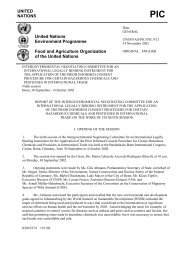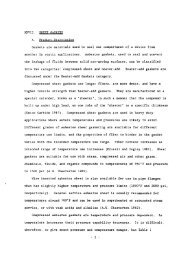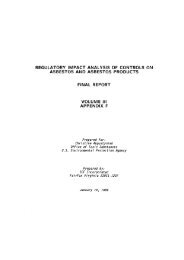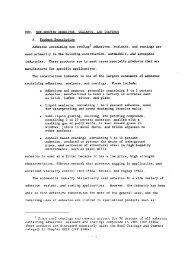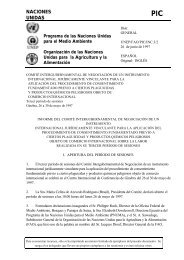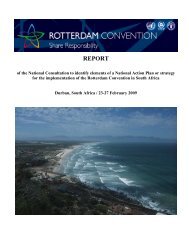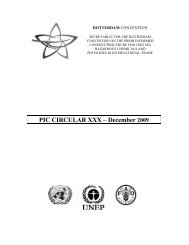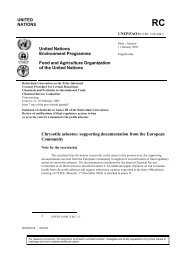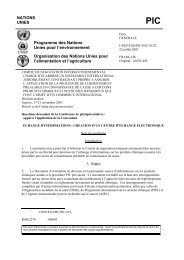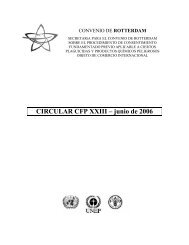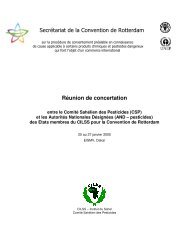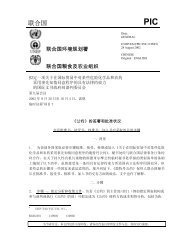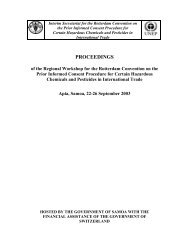Rep o rt of th e tw en - Rotterdam Convention
Rep o rt of th e tw en - Rotterdam Convention
Rep o rt of th e tw en - Rotterdam Convention
You also want an ePaper? Increase the reach of your titles
YUMPU automatically turns print PDFs into web optimized ePapers that Google loves.
in national and international <strong>of</strong>ficial languages, and cooperate better in advances in cultivation <strong>of</strong><br />
Streptomyces avermitillis.<br />
3.6 Fiji Islands<br />
The contribution <strong>of</strong> <strong>th</strong>e Quarantine and Inspection Division to improve <strong>th</strong>e livelihood <strong>of</strong><br />
Fiji’s rural population and alleviate pove<strong>rt</strong>y was <strong>th</strong>rough <strong>th</strong>e <strong>en</strong>forcem<strong>en</strong>t <strong>of</strong> <strong>th</strong>e monitoring<br />
and surveillance regulatory services, and <strong>th</strong>e empowering <strong>of</strong> <strong>th</strong>e g<strong>en</strong>eral and traveling public to<br />
protect Fiji’s natural resources (plants and animals) and its <strong>en</strong>vironm<strong>en</strong>t for agriculture and o<strong>th</strong>er<br />
economic/social developm<strong>en</strong>ts.<br />
The Division was responsible for facilitating <strong>th</strong>e increase in <strong>th</strong>e expo<strong>rt</strong> <strong>of</strong> Fiji’s agricultural<br />
fresh produce and processed products and <strong>th</strong>e provision <strong>of</strong> monitoring and surveillance regulatory<br />
services to effectively manage <strong>th</strong>e quarantine risks associated wi<strong>th</strong> impo<strong>rt</strong>s into Fiji.<br />
The review <strong>of</strong> Fiji’s Plant Quarantine Act 1985 was aimed at aligning <strong>th</strong>e Act wi<strong>th</strong> <strong>th</strong>e WTO<br />
principles and SPS requirem<strong>en</strong>ts and would be completed in 2005.<br />
Wi<strong>th</strong> <strong>th</strong>e decline in <strong>th</strong>e sugar industry and <strong>th</strong>e boom in <strong>th</strong>e tourism sector, Fiji’s agriculture<br />
sector must be vibrant, dynamic and constantly evolving to keep pace wi<strong>th</strong> <strong>th</strong>e increasing chall<strong>en</strong>ges<br />
and promotion <strong>of</strong> <strong>th</strong>e transition from traditional production to commercialization <strong>of</strong> <strong>th</strong>e markets.<br />
This transition required an IPM approach to control pests whilst maintaining <strong>th</strong>e food safety and<br />
quality standards for <strong>th</strong>e markets.<br />
The re-organization <strong>of</strong> <strong>th</strong>e Quarantine and Inspection Division <strong>en</strong>compassed <strong>th</strong>e review <strong>of</strong><br />
Legislation, cost recovery exercise, establishm<strong>en</strong>t <strong>of</strong> <strong>th</strong>e National Biosecurity and Expo<strong>rt</strong> Advisory<br />
Council, National Plant Protection Organization and <strong>th</strong>e overall str<strong>en</strong>g<strong>th</strong><strong>en</strong>ing <strong>of</strong> <strong>th</strong>e division in terms<br />
<strong>of</strong> facilities, staffing and resources, to effectively play its critical roles and successfully meet <strong>th</strong>e<br />
chall<strong>en</strong>ges ahead.<br />
3.7 India<br />
India is an agrarian country. Plant protection involved protection <strong>of</strong> agriculture from pests<br />
and diseases <strong>th</strong>rough promotion <strong>of</strong> IPM, regulatory measures to prev<strong>en</strong>t introduction <strong>of</strong> exotic pests/<br />
diseases, <strong>en</strong>suring availability <strong>of</strong> safe and quality pesticides and bio-pesticides, and training <strong>of</strong> ext<strong>en</strong>sion<br />
functionaries in plant protection and locust control in <strong>th</strong>e scheduled dese<strong>rt</strong> areas.<br />
The Directorate <strong>of</strong> Plant Protection, Quarantine and Storage under <strong>th</strong>e Ministry <strong>of</strong> Agriculture,<br />
Governm<strong>en</strong>t <strong>of</strong> India is <strong>th</strong>e National Plant Protection Organization exclusively devoted to plant<br />
protection services in <strong>th</strong>e country. In <strong>th</strong>e States, Plant Protection exists from <strong>th</strong>e block level upwards.<br />
At <strong>th</strong>e State Headqua<strong>rt</strong>ers, <strong>th</strong>e Plant Protection work is att<strong>en</strong>ded to by a Joint Director (Plant Protection).<br />
At <strong>th</strong>e national level, major emphasis is giv<strong>en</strong> to <strong>th</strong>e promotion <strong>of</strong> Integrated Pest Managem<strong>en</strong>t<br />
to minimize <strong>th</strong>e use <strong>of</strong> harmful pesticides. Under <strong>th</strong>is programme, farmers were trained <strong>th</strong>rough<br />
FFSs to grow heal<strong>th</strong>y crops and manage pests/diseases wi<strong>th</strong> need-based use <strong>of</strong> chemical pesticides.<br />
To <strong>en</strong>courage <strong>th</strong>e bio-pesticide industry, <strong>th</strong>e data requirem<strong>en</strong>t for registration <strong>of</strong> bio-pesticides has<br />
be<strong>en</strong> simplified and commercialization <strong>of</strong> all such bio-pesticides was allowed during <strong>th</strong>e period <strong>of</strong><br />
provisional registration.<br />
Through regulatory measures, <strong>th</strong>e Governm<strong>en</strong>t <strong>en</strong>couraged <strong>th</strong>e impo<strong>rt</strong> <strong>of</strong> elite varieties <strong>of</strong><br />
seeds and planting materials for increasing production and productivity <strong>of</strong> various crops. All impo<strong>rt</strong>s<br />
<strong>of</strong> plants and plant materials were based on pest risk assessm<strong>en</strong>ts. In order to harmonize <strong>th</strong>e<br />
phytosanitary activities in line wi<strong>th</strong> international standards, a total <strong>of</strong> 19 standards were developed<br />
14



